
I was listening to NPR a few nights ago while cooking dinner and was excited to hear about a group of Christian and Catholic clergy in Alabama taking action against a new anti-immigrant law in their state.
A few months ago, Alabama followed in Arizona’s footsteps in passing a bill that many are calling the most sweeping anti-immigrant law in the country, going even farther than Arizona’s highly controversial SB 1070.
Alabama’s new bill, H.B. 56, includes similar provisions to Arizona’s SB 1070, including one that authorizes local police to ask anyone they stop about their immigration status based on “reasonable suspicion,” amounting to the legalization of racial profiling.
[H.B. 56] bars illegal immigrants from enrolling in any public college after high school. It obliges public schools to determine the immigration status of all students, requiring parents of foreign-born students to report the immigration status of their children.
The bill…also makes it a crime to knowingly rent housing to an illegal immigrant. It bars businesses from taking tax deductions on wages paid to unauthorized immigrants. (link)
The law also makes it illegal to enter into a contract with, harbor, or transport undocumented immigrants.
Alabama’s Methodist, Episcopal, and Roman Catholic Churches have sued the state of Alabama over this law, saying it violates their religious freedom. Melissa Patrick of the United Methodist Church of Alabama states, “This new legislation goes against the tenets of our Christian faith — to welcome the stranger, to offer hospitality to anyone.”
 Guestblogged by Mewa Singh.
Guestblogged by Mewa Singh.
A young and vibrant community in the diaspora, it is incumbent upon us to remember our trailblazers. Hari Singh Everest was one such person. I remember reading his name during my undergraduate days. Stumbling across the ‘Sikh Review’, when I should have been completing other studies, it was the first time I had read a literate Sikh journal in English. Skimming the names of editors and contributors on the back, I noticed one from my very own California – Yuba City to be exact. Hari Singh Everest. I didn’t know him, but the unusual last name stuck in my head.
It would be years later when I finally met him. Some years ago the Jakara Movement decided to sponsor the efforts of all the collegitate Californian Sikh Students Associations (SSAs) in building a unity float. Since then, the float at the Yuba City Nagar Kirtan has become an annual affair.. The Everest Family graciously opened their home and it was on one such opportunity that I got to sit down with Hari Singh and speak to him. I mentioned that I had read his name on that Sikh Review issue years ago and he smiled. He talked about his experiences in the Sikh community and as being a sort of ambassador during those early years. It is a conversation I cherish.
His life in the United States stretches back to the 1950s (before the ‘Great Society’ immigration policy of LBJ) and his life in Yuba City goes back to 1961.
UPDATES 8/20/11 as of 12:30pm
The pardhan of the pind Gurdwara tries to state that the whole village apologizes, without giving any specificity as to the culprits or accountability for the action. One Singh in attendance will not stand for it:

Yesterday, Punjabi Radio USA spent an entire show on the issue, interviewing a member of the SGPC as well as some people that have traveled to the village and give their eye-witness testimonials

Still no news on the Tribune India (English) page. There is news on their Punjabi page as well as that of the Ajit and other Punjabi news outlets.
—————————————————-

NYC Sikhs speak out against the Transit Authority's religious discrimination in 2009
This morning, the New York City Council voted unanimously to pass the Workplace Religious Freedom Act (Int. 632-A), a bill that will strengthen the city’s human rights law that protects employees from religious discrimination at their jobs.
According to the City Council,
This law will provide greater protection to workers by strengthening the law that requires employers to provide employees with reasonable accommodations for religious observance.
Employers that are found to have engaged in unlawful discriminatory practices against its workers may be liable for a civil penalty of as much as $125,000 and/or be required to pay compensatory damages, award back pay, reinstate employees and extend full and equal accommodations to employees.
The law is of particular significance to turban-wearing Sikhs and hijab-wearing Muslims who have faced a great deal of discrimination in their workplaces in NYC, particularly since 9/11. Advocates including the Sikh Coalition (who played a lead role in pushing for the legislation) hope that the law will make it much harder for employers in both the public and private sectors to discriminate against potential or current Sikh employees. Notably, the New York Police Department still does not allow turban-wearing Sikhs to serve as officers. (There was a case years back involving a Sikh traffic cop, however, who ended up winning and serves with his turban).
Guest blogged by Gurchit Singh. Gurchit is a 16-year-old aspiring activist (in his own words) who submitted this piece (his first) to The Langar Hall. Raksha Bandan was last Saturday, August 13th.
Oh the joys of Raksha Bandan! The air is filled with love, family members are conversing and munching on a plethora of  sweets, hugs and kisses are being ecstatically extended to any and all family members the overemotional-mother can seem to get her loving arms around, and the overall mood in the home is one which many families can only dream of experiencing on a daily basis. Unfortunately, these loving moments only further promote a holiday which demotes women and opposes aspects of Sikhism itself.
sweets, hugs and kisses are being ecstatically extended to any and all family members the overemotional-mother can seem to get her loving arms around, and the overall mood in the home is one which many families can only dream of experiencing on a daily basis. Unfortunately, these loving moments only further promote a holiday which demotes women and opposes aspects of Sikhism itself.
While occupying myself with Facebook and sipping warm milk on the morning of Raksha Bandan, I was going through my daily routine of checking any notifications I may have received from the prior night. After reading many generic Raksha Bandan-related salutations, I finally came across one that actually defined what it was actually aimed at achieving: “Raksha Bandhan is a festival which celebrates the relationship between brothers and sisters. The ceremony involves the tying of a rakhi (sacred thread) by a sister on her brother’s wrist. This symbolizes the sister’s love and prayers for her brother’s well-being, and the brother’s lifelong vow to protect her.” While reading this definition, the two phrases that IMMEDIATELY jumped out at me were “sacred thread”, which conjured an instant connection to one of Guru Nanak Dev Ji’s earliest forms of rebellion against what he believed aimless and biased: the Janeu ( the full Sakhi can be referenced here), and “brother’s lifelong vow to protect her”, which called forth an image of a frail young woman constantly relying on her brother for protection from external occurrences.
We have many songs that remind us of Shaheeds; we acknowledge them in our Ardas; and they are an integral part of our Sikh history. It is a powerful experience to hear how an integral concept in Sikhi manifests in other communities. Specifically the Muslim community, which also adheres to a concept of Shaheedi.
Often times in the media, the concept of Shaheedi has been presented as a form of “brainwashing” done by religious and political leaders to condone terrorism and violence for their own self-interests. However, a recent NPR report highlights how two devote Muslim men from America became Shaheeds out of their own strong will to bring justice back to their home country of Libya.
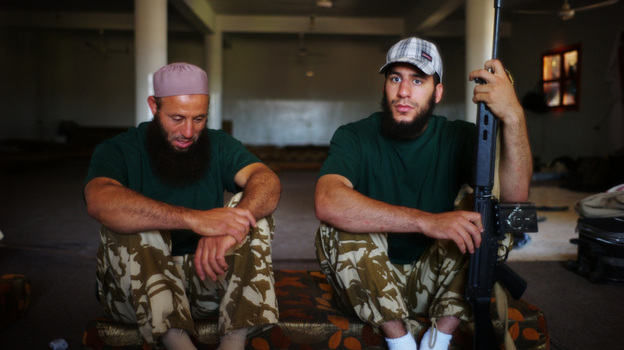
Mabruk Eshnuk (left) and his son Malik (right) left their home in Pittsburgh to volunteer and fight with rebels in western Libya's Nafusa Mountains.
A father and son left their home in Pittsburgh, Pennsylvania (USA) to participate in the Libyan revolution. Mabruk Eshnuk and his 21-year old middle son, Malik Eshnuk, died fighting the forces loyal to Moammar Gadhafi in western Libya.
Mabruk, a devoute Muslim had immigrated from Libya as a teenager. He taught Islam to convicts in the Pennsylvania state penitentiary system. In 2006, he housed the family of a young Iraqi boy who was getting lifesaving treatment in the United States. He said, “Everything that we do and work and help, it’s based on the Quran.” Outraged over what was happening in Libya, he took his middle son to fight in the Western mountains of Libya.
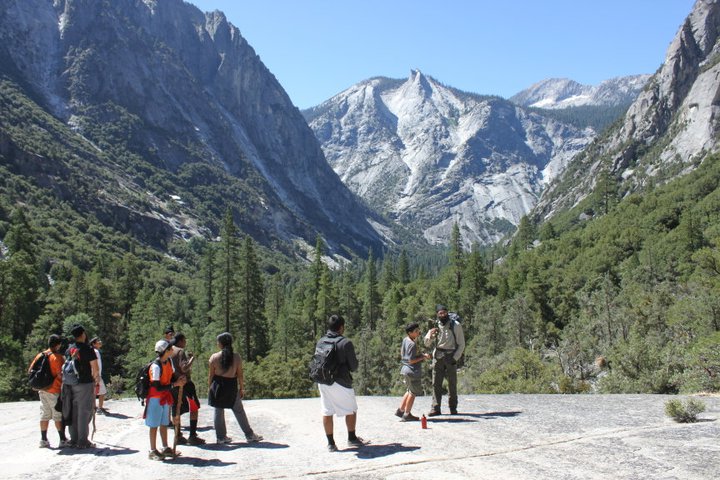 Guestblogged by Mewa Singh.
Guestblogged by Mewa Singh.
Here are some general musings and broader notes/reflections that were sparked by my participation in the camp:
On Parenting – One thing I found quite interesting was changes in parenting styles. I don’t remember having had many choices as a child, when my parents were going to put their foot down, and it seems my own parents confirm this. With the camp, I noticed we had so many parents expressed their desire for their sons to attend, only to begin avoiding our calls as the date approached and telling us our son doesn’t want to go. Many of the same parents often complained – our son doesn’t listen to us and just watches TV all day. I was left wondering, how do these children have the choice? A parent has the ability to parent and limit the child’s television viewing, if they so desire. A parent is not helpless to say our child doesn’t listen so we must accept the status quo. Many parents desire to be the ‘friend’ of their child, or be the ‘good guy/gal’ and never say ‘no.’ With so many of my friends young parents, I wonder how they will be setting boundaries.
On Consumerism – Now members of our community are part of the broader society and one would hardly expect larger sociological issues such as consumerism to not affect us. Still the degrees seem far more now than in my youth. I remember kids having and even getting beat up and their shoes stolen if they had the latest Jordans. With 13-year olds having iPhones, 16-year olds getting BMWs for their birthdays (Jodha had a reflection on this some time ago), and wardrobe prices that went far beyond our $15 jeans from Marshalls, I wonder what are we teaching our children? Ask parents to send their children to a Sikh workshop or even Punjabi/Khalsa school at their Gurdwara and parents will begin about fees being far too high. What do we actually value and what do we wish to teach our children to value?
Guest-blogged by Mewa Singh. Mewa Singh is a sevadar with the Jakara Movement.
Reviving and reinterpreting our historic terminology were part of the naming process of this unique camp.
With the Guru’s Grace, from August 1-10, I had the opportunity to be a sevadar for the Jakara Movement’s first annual Bhujangi Youth Academy. Unlike anything else in our community before, the academy specifically served the needs of at-risk young Punjabi Sikh males.
Yes, we disagree. Yes, most of you even fight amongst yourselves. Our voices and opinions are as diverse as the people in our community. So be it. This is how we learn from one another.
Sometimes you challenge us (the bloggers). Most of the time you challenge each other (the commenters). Do I wish the level of discussion with each other could be raised? At times, yes. Do I appreciate that you take the time to engage? ABSOLUTELY! Why? Because you care enough about the community, about Gurbani, about our collective future to engage.
Along with the start of the holy month of Ramadan, the last few weeks have seen an increase in momentum for laws that ban the wearing of the burqa and niqab in European 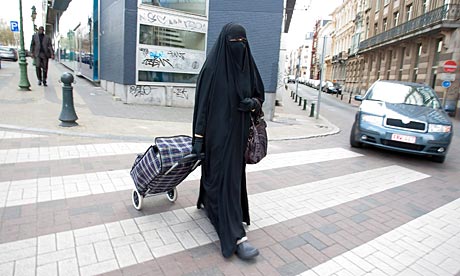 countries. We’ve talked about France before, where the implementation of its law banning Muslim face covering began this past spring. Now Belgium, which passed a similar measure last year, has begun implementing its ban on burqas as of July 23rd, and in Italy, new anti-burqa legislation was just passed by a parliamentary commission this week.
countries. We’ve talked about France before, where the implementation of its law banning Muslim face covering began this past spring. Now Belgium, which passed a similar measure last year, has begun implementing its ban on burqas as of July 23rd, and in Italy, new anti-burqa legislation was just passed by a parliamentary commission this week.
In both countries, like France, a miniscule number of women actually wear the burqa or niqab, begging the question of why an increasing number of European nations feel so threatened by it.
In Belgium, the lawmaker who proposed the bill, Daniel Bacquelaine, “said it was necessary to forbid the wearing of clothes that ‘totally mask and enclose’ the wearer. He described wearing the burqa as ‘not compatible with an open, liberal, tolerant society.’ Peter DeDecker of the Flemish separatist NVA saw the ban as a way of defending ‘our fundamental principles of the enlightenment.'”
Just as in France, what I would argue (and have previously argued) is an attack on religious freedom is being justified with the rhetoric of freedom and liberty (and public safety).
I love books – but I have a special, and perhaps curious, interest in books by and about Sikhs. Perhaps it’s the fascination to discover how similar or different our experiences are. I’m convinced i’m not alone in this. There has been an established interest in South Asian literature for quite some time, but now – with the growing number of authors covering the British Sikh or North American Sikh experience – there is piqued enthusiasm in diasporic “Sikh Literature”. I think it’s important to support this type of work – not simply because the author is Sikh or writes about Sikhs – but because until we have enough of this representation in literature, we need to encourage it’s growth. This also means that authors will be faced with higher expectations from their readers who want authentic stories, sophisticated writing and dymanic story telling – just as we’d expect from any other piece of literature.
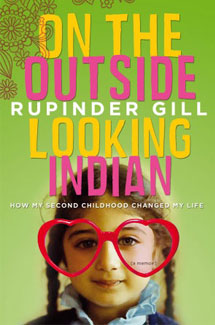 I recently read Rupinder Gill’s memoir, On the Outside Looking Indian. The premise and cover of the book attracted me, perhaps because it reminded me of Sathnam Sanghera’s, If You Don’t Know Me By Now – a book I highly recommend. Gill’s memoir, similar to Sanghera’s, deals with her personal experience growing up as the child of immigrants. Gill’s story is set in Canada and focuses on her year-long quest, at the age of about 30, to fulfill a list of her childhood dreams — learning to swim, going to Disney World, and living in New York etc – activities she didn’t participate in as a child. I found Gill’s descriptions of her childhood to be well-written, funny and often relatable.
I recently read Rupinder Gill’s memoir, On the Outside Looking Indian. The premise and cover of the book attracted me, perhaps because it reminded me of Sathnam Sanghera’s, If You Don’t Know Me By Now – a book I highly recommend. Gill’s memoir, similar to Sanghera’s, deals with her personal experience growing up as the child of immigrants. Gill’s story is set in Canada and focuses on her year-long quest, at the age of about 30, to fulfill a list of her childhood dreams — learning to swim, going to Disney World, and living in New York etc – activities she didn’t participate in as a child. I found Gill’s descriptions of her childhood to be well-written, funny and often relatable.
Without a doubt, many of us can relate to childhoods of inactivity – unless activity consisted of housework – then no, we really didn’t participate in many activities, especially compared to how busy and structured the lives of children are today. There are obvious exceptions to this, however, this is most likely a common experience for many. While Gill’s story is framed around a Panjabi Sikh household, it’s clear that her experiences could be those of many first-generation children whose parents have emigrated to new lands.
My childhood was full of insecurity and self-doubt, the result of years of harassment, taunts, and jokes about the ball/rag/tomato/towel/etc. on my head as a turban-wearing child. My insecurities, however, began to shift (or expand) as puberty hit. Let’s call it facial hair anxiety.
At first, having a moustache grow in at a young age wasn’t necessarily a bad thing. After all, I passed as much older than I was, which was nice for a scrawny brown kid like me.
But soon enough, the complex around my dhari (beard) settled in, and no amount of time with a thatha tied tightly  around my head was ever enough to totally alleviate my beard insecurities.
around my head was ever enough to totally alleviate my beard insecurities.
Surrounded by peers for whom shaving was a rite of passage into manhood, it’s not surprising that I felt a little left out (though to be clear, the idea of a razor on my face never sounded so pleasant). Further, I was inundated with the voices of young women in my school casually referring to facial hair as gross or unattractive (with no intention to hurt my feelings I’m sure) and their preference for guys who were “clean-shaven.”
CLEAN-shaven. The implication being that facial hair is…dirty?
These are the messages we get from our peers and from the media every day. So naturally I assumed it was highly unlikely that any of my female classmates would ever be interested in dating someone like me. The combination of a dirty face plus a patka was enough to cause a whole lot of anxiety and insecurity for this angsty teenage Singh.
I just got an email from the Working Families Party (a progressive political party in NYC) about the latest developments in mega-corporation Walmart’s latest attempts to set up shop in NYC. One of the biggest real estate development companies in the city called Related is reportedly in discussions with Walmart about building its first NYC store in the Brooklyn neighborhood of East New York. The below video put together by ALIGN, the Alliance for a Greater New York, features a Sikh business owner, Iqbal Chhabra.

This video warmed my heart for several reasons. It goes without saying that I live in Brooklyn and am concerned with all things Brooklyn. Brooklyn is not exactly known for its large Sikh population. I see the occasional Sikh construction worker or shop owner, but I don’t know of too many other Brooklynwale Singhs or Kaurs. So I was pleasantly surprised to see Mr. Chhabra speaking out about an important Brooklyn-based issue in this video.
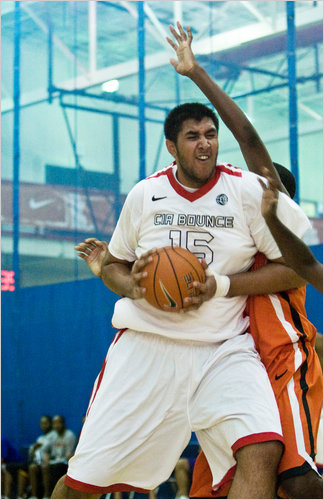 It wasn’t quite the Bhullar I was looking for when I was googling information last week, but it did warrant a revisit.
It wasn’t quite the Bhullar I was looking for when I was googling information last week, but it did warrant a revisit.
Some time ago I wrote an article about how I wish I was a lil bit taller, highlighting the Brother Bhullar – Sim and Tanveer.
Sim is in the press again. The 7’4” Brampton native is all set to join Xavier University in the fall. Until then, he had been helping Team Canada in the FIBA under-19 world championships in Latvia. Sim had a crushing performance against the South Koreans, dumping 24 points and grabbing 14 rebounds. Messed around and got a double-double.
In a New York Times article this week, featuring Sim, Heidi Ueberroth, the president of NBA International stated:
“Having a player from India in the N.B.A. is a question of when, not if. We have no doubt that the elite players from India will emerge.”
I would make a major correction and substitute Punjab for India.
Check out his highlight reel, before clicking below the fold.

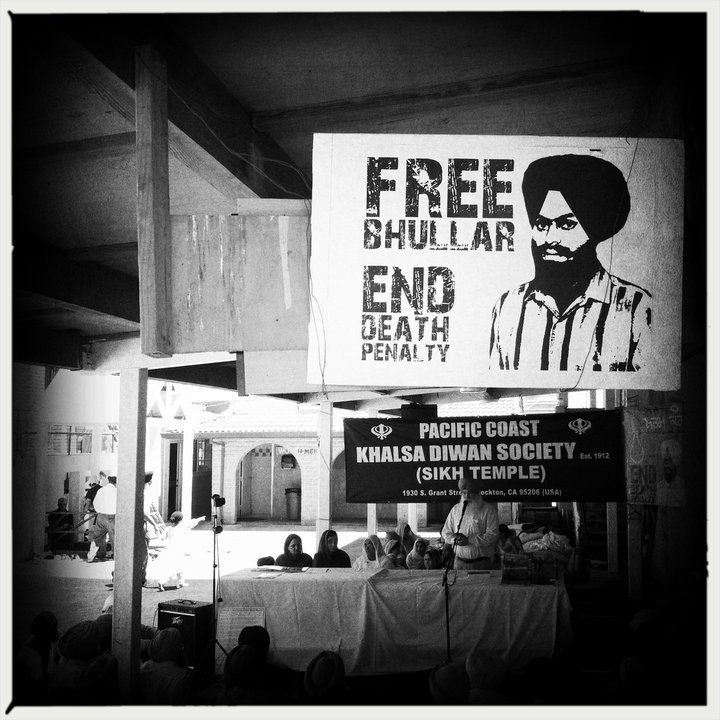 This post has been long overdue. Pagh salute to @SimNona for pushing me to finalize and publish it.
This post has been long overdue. Pagh salute to @SimNona for pushing me to finalize and publish it.
Larger and larger sections of the Sikh community are becoming familiar with the case. Despite the snide comments of the Indian media, even they have caught wind to the increasing T-shirts being seen far and wide, throughout Punjab. The Canadian youth, with the Sikh Activist Network at the forefront, have expressed their concern. The Sikh Federation has pushed for resolutions in the European Parliament and statements of concern by UK Parliamentarians. Amnesty International has weighed in with its opinion. This past weekend the mother of the discussed pleaded the case at the historic Stockton Gurdwara.
What am I talking about? The case of Professor Devender Pal Singh (Davinderpal Singh Bhullar).
Really I don’t. Although independent bookstores are often preferable (I swear I am not a hipster), sometimes even Barnes and Noble (see a hipster would never go there!) or Borders (are they even in business?) will do.
Since I was a kid though, I would always look for books that might have anything remotely to do with Sikhi. The closest we get in our American bookstores are some comprehensive book on religion, usually in the bargain section, and written by some crackpot. This one is presented to you by a professor at Cambridge (@blighty, where you at?)
Oh the bane of my childhood. Then as in now – this is what we get.
Here is the cover….
 Ok, fair enough, nothing really wrong about that. So now let us flip the the chapter on Sikhi. Let’s see what we find….
Ok, fair enough, nothing really wrong about that. So now let us flip the the chapter on Sikhi. Let’s see what we find….
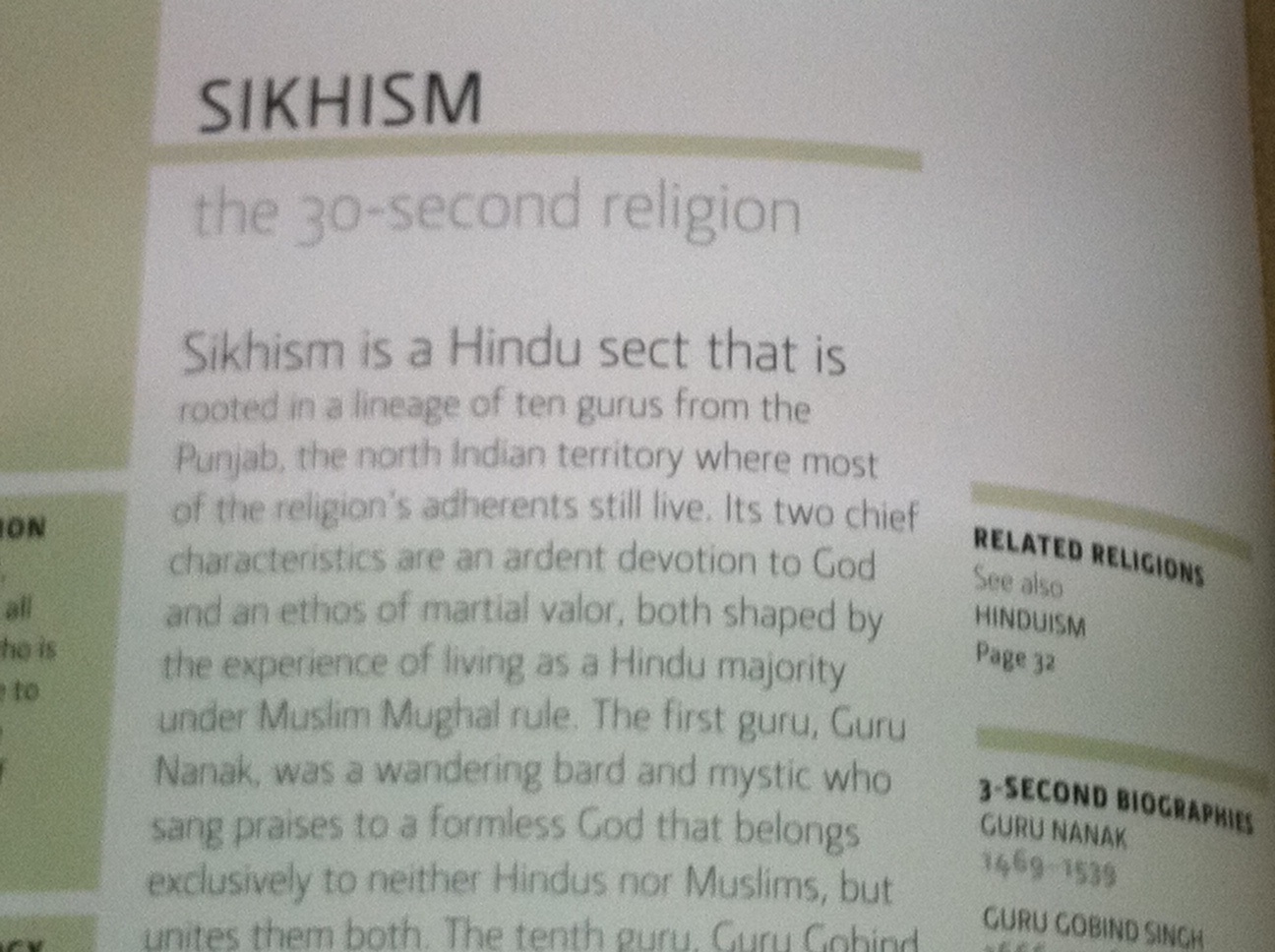
Aaaaaaaaaaaaaand there we go….first sentence! When can we move beyond this? The community has. When will academics and other popular writers move beyond this disinformation that later does get parroted by young Sikhs. Suggestions?
For those interested. The professor’s email address can be found here and his facebook page here. Maybe we can message him? DO IT RESPECTFULLY!!!!!! WE ARE JUST INFORMING, NOT ACCUSING!
 So for this post, I again turn towards Canada, but this time focusing on football (sorry Blighty – let me translate for you – “badibididongbong” or “makubadabuda”, lol).
So for this post, I again turn towards Canada, but this time focusing on football (sorry Blighty – let me translate for you – “badibididongbong” or “makubadabuda”, lol).
Back in the day I wrote a post on this budding football player and since that time many thought he dropped off the map. Despite the lapse in time, this now 28 year old, Singh is still trying to fulfill his football dreams.
At 28, most players who have yet to make an impact would have gone on to the next phase of their life. Bassi says he cannot yet because his football career, in a sense, has yet to start.[link]
Now on the practice team of the B.C. Lions, Bassi is still striving for his opportunity. Despite a career that has been so-far plagued by injury, this Singh remains in chardikala (eternal optimism!)
“That’s why I never gave up,” he said after his first formal workout with the Lions after six seasons Monday. “This is a new time in my life and I have an amazing opportunity.”[link]
Whatever the outcome the Sikh community will still continue to root for him.
Guest blogged by Pataka
 The intersections between Sikhism, gender issues, and academia have always been tenuous and fragile ones. As other posts on this blog have mentioned, there have been some recent pushes to democratize academic research as well as examine and undo the longstanding patriarchy which has surrounded academia in general by including discussions of gender politics as well as Sikh women scholars. For more information on SAFAR take a look at previous posts on this issue or visit their website: www.sikhfeministresearch.org .
The intersections between Sikhism, gender issues, and academia have always been tenuous and fragile ones. As other posts on this blog have mentioned, there have been some recent pushes to democratize academic research as well as examine and undo the longstanding patriarchy which has surrounded academia in general by including discussions of gender politics as well as Sikh women scholars. For more information on SAFAR take a look at previous posts on this issue or visit their website: www.sikhfeministresearch.org .
Our Journeys Conference 2011
On October 1st, 2011, SAFAR –The Sikh Feminist Research Institute will host a one-day conference entitled Our Journeys Conference 2011 at The Centre for Women’s Studies in Education (CWSE), Ontario Institute for Studies in Education of the University of Toronto (OISE), University of Toronto, Ontario, Canada.
Guest-blogged by Mewa Singh. Mewa Singh is a sevadar with the Jakara Movement.
Previously, here in The Langar Hall, there was a discussion by Navdeep Singh on an important panel discussion, held in NYC, on faith, feminism, and Sikhi. Brooklynwala had asked for a comment and report about Lalkaar 2011, and I am more than happy to oblige.
However, before getting into that, I wanted to strongly encourage our Sikh youth sangat throughout California to come to Fresno/Kerman this coming weekend for an amazing opportunity. While most Sikh organizations depend on large contributions by high-fly financiers with their own set of pre-conditions, Sikh youth organizations such as the Jakara Movement and the Sikh Activist Network do not. The Jakara Movement’s biggest donors are its own members, making small contributions and the sweat and blood of its own members that come every year to sell fireworks. This is truly grassroots, where the youth give their own labor for causes and projects they love. Check out the video, follow the facebook event page to sign up, and then click below the fold for my report on Lalkaar 20111.
 Toronto is abuzz. This weekend the IIFA [International Indian Film Academy] awards are being held in Toronto to many a South Asian’s delight. We are, however, delighted about Toronto for another reason. This weekend, The Sikh Activist Network will be hosting When Lions Roar 3 – a night of hip hop, poetry, R&B and other art to remember the events of 1984.
Toronto is abuzz. This weekend the IIFA [International Indian Film Academy] awards are being held in Toronto to many a South Asian’s delight. We are, however, delighted about Toronto for another reason. This weekend, The Sikh Activist Network will be hosting When Lions Roar 3 – a night of hip hop, poetry, R&B and other art to remember the events of 1984.
There is much that can be said about the comparisons between the two events. The IIFA essentially celebrates bollywood – an industry that frustrates many conscious Sikhs living in both India and the diaspora. The representation of Sikhs in bollywood films has been an area of discontent with Punjabis and Sikhs being portrayed as hypermasculine and other cringe-worthy stereotypical roles [read Navdeep’s piece, Media and the Sikhs]. While many applaud the increased presence of Sikh turbans in bollywood films, others may argue that this presence has not necessarily changed the typical Indian’s perception of Sikhs in a positive way. For example, in Indian media – Sikhs continue to be portrayed with words such as terrorist, extremist and radical [read this inaccurate and uninformed article]. I’m not anti-bollywood by any means – there are definite exceptions to the bollywood trend of representing Sikhs in a one-dimensional manner. However, I think it’s important that as a community, we stay informed and expect authentic representation of Sikhs (whether in books or films or other art forms). Bollywood is a huge industry that has an enormous influence on building or breaking down perceptions of groups and communities. [Side note: it’s interesting to me that discussions about Sikhs in bollywood never revolve around Punjabi or Sikh women. This may be a good or bad thing, but perhaps it’s a discussion for another time].
It is clear that the Sikh community cannot rely upon an industry to change overnight – instead, we should focus on supporting and celebrating the immense diversity that makes up our community.

